QUITO, Ecuador (AP) — Ecuador’s President Guillermo Lasso is once again making use of the executive’s power to suspend people’s rights of assembly in some areas and mobilize the military in an attempt to quell the most recent wave of violence that has left at least 18 people dead in the South American country.
Lasso on Tuesday declared a state of emergency covering all of its prisons and ordered the deployment of 2,700 soldiers and police officers to regain control of the facilities. Less than 24 hours earlier, Lasso had announced an emergency measure suspending people’s rights to assembly and move freely in two provinces, one of which includes a city where a mayor was fatally shot over the weekend.
The order covering the prisons came after clashes erupted Saturday at the country’s largest prison and escalated into the early hours of Sunday, with gunshots and explosions heard by people in nearby residential areas. The initial clashes at the Litoral Penitentiary, located in the port city of Guayaquil, left at least 18 dead and 11 injured, including a police officer.
“The use of weapons, including bladed weapons, long guns and even explosive devices and grenades, by organized crime groups inside prisons puts everyone’s security at risk,” according to the state of emergency decree. “So, when the national police cannot provide security with a sufficient logistical contingent, the participation of the armed forces can provide support in crisis management.”
Ecuador is gripped by a serious outbreak of violence that authorities attribute to disputes among organized crime groups. The government is also grappling with a surge in crime that includes armed attacks, kidnappings, robberies and extortion.
Hours after Tuesday’s announcement a Molotov cocktail exploded in an office of the Attorney General in the province of Esmeraldas, which authorities have identified as an important territory for drug cartels. The Armed Forces also reported soldiers had deactivated explosive devices placed at different gas stations in the province.
Since taking office in May 2021, Lasso has used state of emergency declarations to address the spread of the coronavirus, stop prison riots, fight drug trafficking and end protests.
Minister of the Interior Juan Zapata told reporters members of the armed forces entered the prison in the early hours Tuesday and began seizing weapons and other contraband. He said crime scene experts will enter Litoral once it is fully secured to verify “actually how many deaths we have.”
“We are not leaving until all the work is completed,” Zapata added. The state of emergency was issued for 60 days.
Litoral, which is located within a prison complex, has a capacity of about 9,500 inmates, but in the first quarter exceeded that number by almost 3,000. It is considered one of the most dangerous prisons in Ecuador. A riot in April left 12 inmates dead, while a gang battle in 2021 killed 119 inmates.
Meanwhile, prisoners in 13 other prisons declared a hunger strike on Monday and are holding a hundred prison guards to demand better sanitary conditions and food, among other issues.
Monday’s emergency measure, which set a curfew from 10 p.m. to 5 a.m., affects the provinces of Los Ríos and Manabí, including the latter’s city of Manta. The city is located along Ecuador’s central coast, an area that according to authorities has coveted routes for drug trafficking.
Manta’s mayor, Agustín Intriago, was killed in a shooting Sunday while touring public works sites. The shooting, which authorities said involved high-caliber weapons, also killed a 28-year-old soccer player Ariana Chancay.
Lasso on Monday told reporters police detained a suspect in the shooting. He did not identify the person, but said is not a citizen of Ecuador.
The United States embassy in Ecuador on its Twitter account called for the case to be investigated and those responsible punished with “exemplary sentences.” Meanwhile, the United Nations office in Ecuador condemned the killing in a statement and called on the government to redouble its efforts to combat the growing violence.




